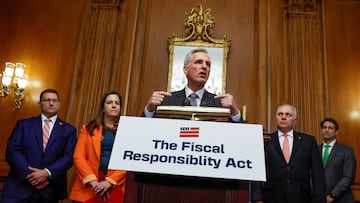Who voted for the debt ceiling bill and who voted against it?
The bill to raise the debt ceiling pass the House with a vote tally of 314 to 117 with more Republicans opposed than Democrats to Speaker McCarthy’s deal.

Congress is making a mad dash to pass legislation to suspend the $31.4 trillion debt ceiling with the nation set to go off a fiscal cliff by 5 June according to the Treasury. The latest hurdle was cleared on Wednesday evening when the House voted 314 to 117 to advance a bill based on the negotiations between President Joe Biden and Speaker Kevin McCarthy. The agreement reached by the White House and GOP on Saturday gave Republicans limited spending cuts in exchange for their votes to allow the US to meet its financial obligations.
Both leaders called on their parties’ members to pass the legislation but in the end more Democrats heeded the call than Republicans with 165 and 149 voting in favor, respectively. Opposed were 71 Republicans and 46 Democrats with four representatives split evenly between both parties not voting.
Who voted for the debt ceiling bill and who voted against it?
Lawmakers on each side of the aisle had their own reasons for voting against the deal that will see spending reduced to below that of 2022 without touching Medicaid, defense and veterans’ health care. Most of the savings come from clawing back unused covid-19 relief funds along with cutting nondefense discretionary expenses. As well, it caps spending for the next two years and places expanded work requirements on food assistance programs.
"Tonight we all made history," says Speaker Kevin McCarthy.
— Bloomberg TV (@BloombergTV) June 1, 2023
The House passed debt-limit legislation forged by McCarthy and President Joe Biden that would impose restraints on government spending through the 2024 election https://t.co/OQut5dch4G pic.twitter.com/FHDNwC1Ekb
Related stories
For GOP lawmakers contrary to the bill’s passage, the spending cuts were not deep enough and they wanted more aggressive work requirements, including for Medicaid. Legislation that they passed along party lines in the House in April had also called for spending caps to run through 2033. Many of those who opposed the bill came from the Freedom Caucus, the GOP’s right flank. The caucus Chair, Scott Perry and Policy Chair Chip Roy voted against it, but Whip Warren Davidson voted in favor and Lauren Boebert, the Communications Chair did not vote.
Democrats that cast a “No” vote on the other hand were opposed to any expanded work requirements on social programs. As well, they were against environmental provisions and increased defense spending that were included in the deal. The majority of votes in opposition to the bill came from the more progressive wing of the party. Both the Progressive Caucus Chair Pramila Jayapal and Whip Greg Casar voted against it.
House members that voted against the debt ceiling bill:
Republicans:
- Mark Alford MO
- Andy Biggs AZ
- Dan Bishop NC
- Mike Bost IL
- Josh Brecheen OK
- Vern Buchanan FL
- Ken Buck CO
- Tim Burchett TN
- Eric Burlison MO
- Kat Cammack FL
- John Carter TX
- Ben Cline VA
- Michael Cloud TX
- Andrew S Clyde GA
- Mike Collins GA
- Eli Crane AZ
- Scott DesJarlais TN
- Byron Donalds FL
- Pat Fallon TX
- Brad Finstad MN
- Michelle Fischbach MN
- Russell Fry SC
- Russ Fulcher ID
- Matt Gaetz FL
- Tony Gonzales TX
- Bob Good VA
- Lance Gooden TX
- Paul A Gosar AZ
- H. Morgan Griffith VA
- Michael Guest MS
- Harriet Hageman WY
- Andy Harris MD
- Diana Harshbarger TN
- Kevin Hern OK
- Clay Higgins LA
- Wesley Hunt TX
- Ronny Jackson TX
- Darin LaHood IL
- Debbie Lesko AZ
- Anna Paulina Luna FL
- Morgan Luttrell TX
- Nancy Mace SC
- Tracey Mann KA
- Brian Mast FL
- Rich McCormick GA
- Mary E Miller IL
- Cory Mills FL
- Alex Mooney WV
- Barry Moore AL
- Nathaniel Moran TX
- Ralph Norman SC
- Andy Ogles TN
- Gary Palmer AL
- Scott Perry PA
- Bill Posey FL
- John Rose TN
- Matt Rosendale MT
- Chip Roy TX
- George Santos NY
- Keith Self TX
- Pete Sessions TX
- Victoria Spartz IN
- Greg Steube FL
- Dale Strong AL
- Tom Tiffany WI
- William Timmons SC
- Jeff Van Drew NJ
- Beth Van Duyne TX
- Michael Waltz FL
- Randy Weber TX
- Ryan Zinke MT
Democrats:
- Nanette Barragán CA
- Suzanne Bonamici OR
- Jamaal Bowman NY
- Cori Bush MO
- Greg Casar TX
- Joaquin Castro TX
- Judy Chu CA
- Yvette D Clarke NY
- Gerald E Connolly VA
- Jasmine Crockett TX
- Rosa L DeLauro CN
- Mark DeSaulnier CA
- Adriano Espaillat NY
- Jesús "Chuy" Garcia IL
- Sylvia Garcia TX
- Daniel Goldman NY
- Jimmy Gomez CA
- Raúl M Grijalva AZ
- Jahana Hayes CN
- Val Hoyle OR
- Jared Huffman CA
- Pramila Jayapal WA
- Sydney Kamlager CA
- Ro Khanna CA
- John B Larson CN
- Barbara Lee CA
- Summer Lee PA
- Jim McGovern MA
- Grace Meng NY
- Gwen Moore WI
- Jerrold Nadler NY
- Alexandria Ocasio-Cortez NY
- Mark Pocan WI
- Katie Porter CA
- Ayanna Pressley MA
- Delia Ramirez IL
- Jan Schakowsky IL
- Robert "Bobby" Scott VA
- Melanie Stansbury NM
- Rashida Tlaib MI
- Norma J Torres CA
- Ritchie Torres NY
- Juan Vargas CA
- Nydia M Velázquez NY
- Nikema Williams GA
- Frederica S Wilson FL


